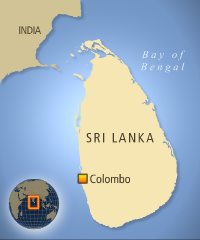Japanese envoy prepares to restart Sri Lanka peace talks
A Japanese envoy prepared to visit India to enlist support for peace efforts in Sri Lanka after failing to persuade Tamil Tigers rebels to hold immediate talks with the government to prevent a slide back into civil war.

A monthlong extension of an emergency law that empowers Sri Lanka's police and military to detain terrorist suspects indefinitely and search premises without warrants, meanwhile, went into effect on Wednesday.
Peace envoy Yasushi Akashi arrived in Sri Lanka on Saturday for a five-day visit, meeting with President Mahinda Rajapakse and Liberation Tigers of Tamil Eelam political wing head S.P. Thamilselvan to try to persuade the warring factions to hold immediate peace talks amid an upsurge in violence that has left 150 people dead since April.
Thamilselvan told Akashi that alleged violence by the military against Tamil civilians must stop and the safety of rebel commanders ensured before they will return to the negotiating table. The military denies the charge, and has accused the rebels of attacking soldiers with anti-personnel mines that can be detonated by remote control.
"We have explained to them (Japanese) that there is no cease-fire environment here, the military has disrupted normal civilian life and is getting ready for an all-out war," the rebel representative told reporters in Kilinochchi, 275 kilometers (170 miles) north of Colombo after Tuesday's meeting.
Akashi stressed the need for the Tigers to participate, saying "it is the responsibility of everybody ... to prevent an escalation of the conflict."
His next stop was India, home to 56 million Tamils, who have traditional and family ties with Sri Lanka's 3.2 million Tamils.
The separatist issue in Sri Lanka often creates political rumblings in Indian politics. The rebels are banned in India as a terrorist organization, but New Delhi backs Sri Lankan government's efforts for a peaceful settlement of the separatist issue.
Japan is Sri Lanka's largest aid donor and is one of the "co-chairs" of Sri Lanka's peace process. The others are the European Union, the United States and Norway. Japan has taken an interest in building peace on the island nation, where 65,000 died before a cease-fire in 2002.
The government and the rebels met for talks in Geneva in February for the first time in three years and agreed to meet again in April. But relations between the government and the rebels have since turned sour, reports the AP.
I.L.
Subscribe to Pravda.Ru Telegram channel, Facebook, RSS!


